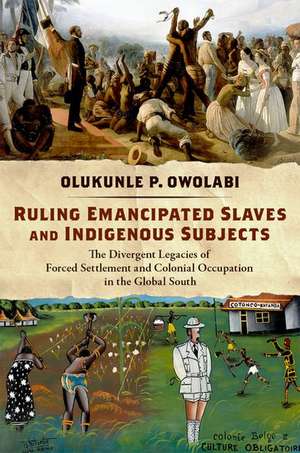Ruling Emancipated Slaves and Indigenous Subjects: The Divergent Legacies of Forced Settlement and Colonial Occupation in the Global South
Autor Olukunle P. Owolabien Limba Engleză Paperback – 11 iun 2023
Preț: 157.16 lei
Preț vechi: 179.00 lei
-12% Nou
Puncte Express: 236
Preț estimativ în valută:
30.09€ • 31.39$ • 25.22£
30.09€ • 31.39$ • 25.22£
Carte disponibilă
Livrare economică 08-14 februarie
Livrare express 05-11 februarie pentru 52.75 lei
Preluare comenzi: 021 569.72.76
Specificații
ISBN-13: 9780197673034
ISBN-10: 0197673031
Pagini: 376
Ilustrații: 9 b/w line drawings; 18 tables; 3 maps
Dimensiuni: 226 x 160 x 38 mm
Greutate: 0.54 kg
Editura: Oxford University Press
Colecția OUP USA
Locul publicării:New York, United States
ISBN-10: 0197673031
Pagini: 376
Ilustrații: 9 b/w line drawings; 18 tables; 3 maps
Dimensiuni: 226 x 160 x 38 mm
Greutate: 0.54 kg
Editura: Oxford University Press
Colecția OUP USA
Locul publicării:New York, United States
Recenzii
This fantastic new book is a major contribution to the literature on colonialism and development. Owolabi addresses the puzzle of why the early colonies with planation slavery often ended up with relatively high levels of development. Owolabi skillfully uses multimethod tools to make an eye-opening argument that merits wide attention among social scientists and historians.
Olukunle Owolabi, in his eye-opening treatise, describes what generations of development economists did not see, namely that countries populated by slaves of forced settlement have brought peace, prosperity, and democracy far outpacing countries of colonial occupation. He then explains why, showing the returns to emancipation and citizenship. My hat off to Owolabi for opening our eyes to what has long been obscured by academic prejudices.
Owolabi demonstrates that forced-settlement colonies are a distinctive form of colonial rule, fostering economic and political trajectories that diverge from-and surpass-the trajectories of other formerly extractive colonies. This counter-intuitive finding offers an important corrective to usual understandings of colonialism and development.
In this book, Owolabi asks an intriguing question and, through an impressive multimethod analysis of several former empires, offers a compelling answer linked to the institutional legacies of colonialism. Ruling Emancipated Slaves and Indigenous Subjects is a must-read for any scholar interested in the long-term impact of colonialism.
A bold, provocative, and persuasive account of the lasting effects of colonial rule. Longue durée arguments are exceedingly difficult to make yet Ruling Emancipated Slaves and Indigenous Subjects delivers on its ambitious goal: to show the importance of emancipation during the colonial era for post-colonial development and democratization.
This excellent book rethinks the consequences of extractive colonial institutions. Analyzing the importance of early legal rights, Owolabi explains the puzzle of why countries in the West Indies have experienced better development outcomes than those in West Africa. This book is a must-read for anyone interested in colonialism, development, and democracy.
This ambitious work will certainly shape the field of comparative political studies of the varied political impact of colonialism for years to come.
Olukunle Owolabi, in his eye-opening treatise, describes what generations of development economists did not see, namely that countries populated by slaves of forced settlement have brought peace, prosperity, and democracy far outpacing countries of colonial occupation. He then explains why, showing the returns to emancipation and citizenship. My hat off to Owolabi for opening our eyes to what has long been obscured by academic prejudices.
Owolabi demonstrates that forced-settlement colonies are a distinctive form of colonial rule, fostering economic and political trajectories that diverge from-and surpass-the trajectories of other formerly extractive colonies. This counter-intuitive finding offers an important corrective to usual understandings of colonialism and development.
In this book, Owolabi asks an intriguing question and, through an impressive multimethod analysis of several former empires, offers a compelling answer linked to the institutional legacies of colonialism. Ruling Emancipated Slaves and Indigenous Subjects is a must-read for any scholar interested in the long-term impact of colonialism.
A bold, provocative, and persuasive account of the lasting effects of colonial rule. Longue durée arguments are exceedingly difficult to make yet Ruling Emancipated Slaves and Indigenous Subjects delivers on its ambitious goal: to show the importance of emancipation during the colonial era for post-colonial development and democratization.
This excellent book rethinks the consequences of extractive colonial institutions. Analyzing the importance of early legal rights, Owolabi explains the puzzle of why countries in the West Indies have experienced better development outcomes than those in West Africa. This book is a must-read for anyone interested in colonialism, development, and democracy.
This ambitious work will certainly shape the field of comparative political studies of the varied political impact of colonialism for years to come.
Notă biografică
Olukunle P. Owolabi is an associate professor of political science at Villanova University, where he teaches courses on Comparative Politics, African Politics, comparative democratization, and the developmental legacies of colonialism. His research examines the developmental legacies of forced settlement and colonial occupation in the Global South and has been published in Comparative Politics. He holds a PhD in Political Science from the University of Notre Dame, and an M.Phil in Latin American studies from Oxford University.
